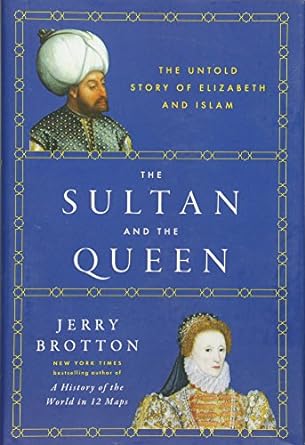|
The Sultan and the Queen: The Untold Story of Elizabeth and Islam
By Jerry Brotton Published in September 2016 338 Pages Thibault’s Score: 5/5 On its face, this book is a history of late medieval England’s relationship with the Ottoman Empire. However, when you dig deeper, it is much more than that. It is actually the history of the beginnings of international trade, global empire, and of a multicultural England. I’m not a big fan of the writing style. I think that the style suffers from academic pedantry, although it isn’t too bad. The writing style isn’t exceptionally clear or concise, but it isn’t bad either. The book covers a wide variety of different contacts in-between Elizabethan England and the Ottomans - military, artistic, and most importantly commercial. It immediately becomes very clear that by the 1500s, England and the Ottoman Empire were much more closely connected than the average person would imagine. The first, and most obvious, connection in between England and the Ottoman Empire is geopolitical. The two shared a common enemy: the Habsburg Holy Roman Empire. Previously, the Ottomans had briefly allied with another Habsburg enemy: France. The Ottomans had a history of alliances with various Christian powers such as Wallachian, Byzantium, Venice, and many others. In 1500, the European country with the largest population of Christians was the Ottoman Empire. From the English perspective, Islam was foreign; but from the Ottoman perspective, Christianity was well understood. Although geopolitics was the main initial driver of Elizabethan and Ottoman relations, it would have - by far - the smallest impact. Within decades of geopolitical contact, trade flourished. Many Englishmen found themselves in the Ottoman Empire; and many Ottomans in England. Very quickly, Turks become a staple of pop culture. The book goes on - at length - about how the Ottomans appear in fictional books, songs, and plays. Even the great Shakespeare writes extensively about Ottomans in plays such as “The Merchant of Venice” and “Othello.” Although I found this to be, by far, the least interesting part of the book, it still managed to captivate me. Finally, the most important connection between England and the Ottoman Empire is through trade. This trade will lay the foundation for later British colonialism. It begins with something I had never heard of: the English state-owned Muscovy company, which was created to attempt to access Middle Eastern markets through Russia. Although trade through Russia would prove ruinously expensive, the nature of state-owned trading companies (as opposed to more market driven initiatives as existed in Italy) would become the bedrock of colonialism. This book details fascinating encounters and adventures involving British merchants in Persia, the Indian Ocean, Russia, Crimea, Morocco, and sub-Saharan Africa. The stories of the brave merchants, who opened the world, is ultimately why I gave this book a five. I recommend reading this book to understand how trade opened up Europe.
0 Comments
Leave a Reply. |
Thibault SerletMost of my articles are book reviews, but I also write about many other topics. Archives
December 2023
Categories |

 RSS Feed
RSS Feed